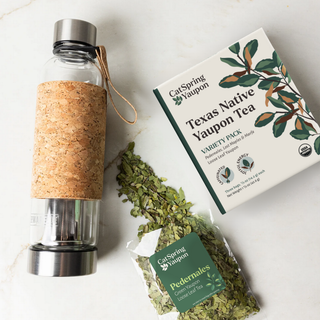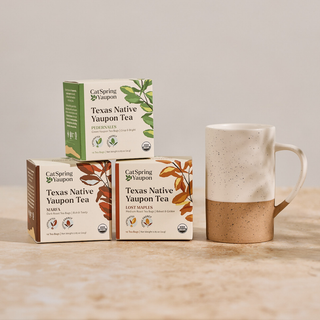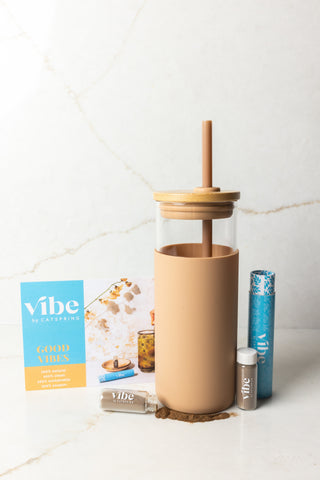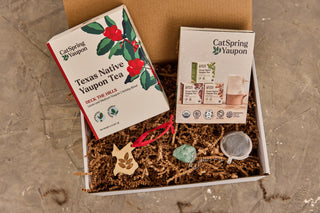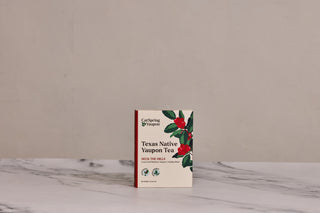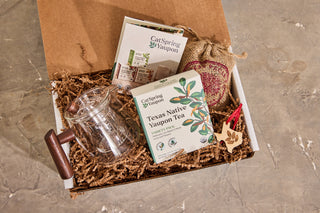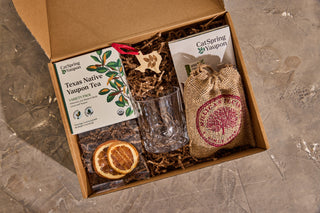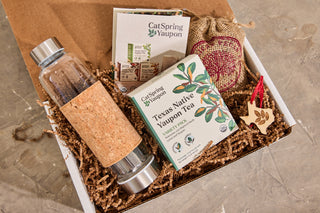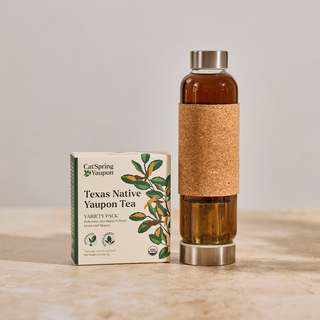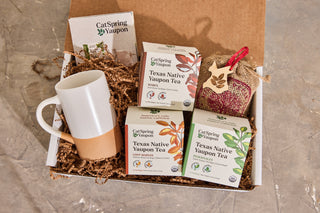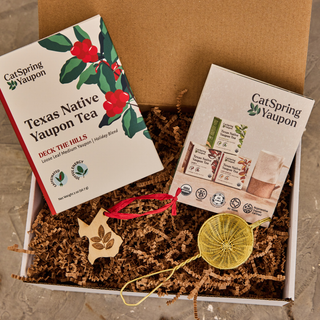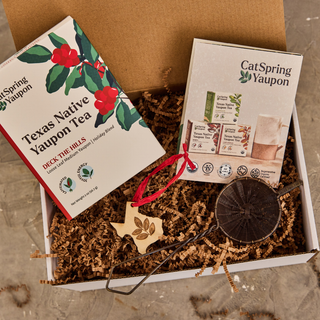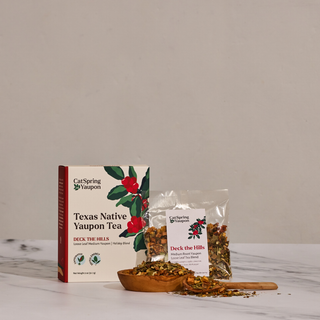Finding relief for depression symptoms comes in a variety of forms and from different lifestyle factors. By reducing stress and anxiety while also improving mood, certain foods and activities can be a powerful method of taking care of yourself and nurturing a healthy self-care routine to address symptoms of depression. In this guide, we ranked and reviewed the best teas for depression.
If you want to get some for yourself, we have a collection of the best teas for depression right here in tea bags, loose leaf, or iced tea pouches.
What is the Best Tea for Depression?
1. Yaupon Tea
Yaupon is the only naturally caffeinated plant native to North America. This means that unlike other teas that are traditionally made with Camellia sinensis, yaupon has unique properties in addition to caffeine. One of these is the pairing with theobromine (the same compound found in chocolate that boosts your mood). When combined with caffeine, theobromine improves performance while minimizing susceptibility to distractions.
Benefits:
- Gives the gentle boost of energy from caffeine tempered by an interaction with polyphenols that can reduce the negative effects on mood.
- Boosts mood thanks to theobromine to combat elevated stress levels.
- Improved attention and improved reaction time thanks to the effects of caffeine and theobromine together.
Side Effects:
- May cause sleeplessness due to caffeine if large amounts of yaupon are consumed all at once.
Try our CatSpring Yaupon tea to receive a gentle boost of energy all day long. It’s organic, non-gmo, kosher, sustainably grown, and naturally caffeinated.
2. Chamomile Tea
Chamomile is primarily brewed from one of two daisy-like species of flower and commonly known for its stress-relieving properties. It’s long been believed to have health benefits though many are still under research. One benefit is supporting a healthy heart through the compound flavones which has the potential to lower blood pressure and cholesterol levels.
Benefits:
- Get stress relief due to the powerhouse compound apigenin.
- Sleep easier thanks again to apigenin that binds to GABA receptors in your brain and releases signals that have beneficial effects such as calming and relaxing you.
- Relax with the soothing aroma, especially around bedtime to go to sleep easier.
Side Effects
- Potential drowsiness that may worsen fatigue from a hangover.
3. Ashwagandha Tea
An evergreen shrub traditionally used in India, Africa, and Asia, it is also known as Indian ginseng or winter cherry. It has been used to reduce stress and anxiety. It is also now known as an adaptogen, providing overall benefits and health support. An anxiolytic, ashwagandha can help ease stress.
Benefits:
- Ease stress as multiple studies have shown both self-reported relaxation and reduced levels of cortisol.
- Decrease pain as it has shown evidence of reducing pain and stiffness as well as decreasing inflammation.
- Help your body manage stress with the adaptogenic properties.
Side Effects:
- May cause an upset stomach if consumed in large quantities.

4. Lavender Tea
Made by steeping lavender buds in hot water, lavender tea is known for its calming properties. It can also help soothe digestive issues. A floral aroma with hints of rosemary and mint, this is a great option for those looking for a caffeine free option that smells and tastes delightful. Most research so far has been done on lavender extract rather than lavender tea, though many of the benefits may be present in both.
Benefits:
- With anti-inflammatory properties, this tea can possibly help soothe irritated tissues.
- The smell of lavender has also been shown to have a soothing effect and ease feelings of cramping.
- Causing drowsiness, lavender can help promote a good night's sleep.
Side Effects:
- Be careful of taking Lavender tea with any other sedatives.
5. Ginseng Tea
Ginseng has been used in Chinese medicine for thousands of years. There are many varieties of ginseng and depending on when it is harvested, it can be fresh, white, or red ginseng. Through antioxidant compounds, ginseng has anti-inflammatory properties and also supports a stronger immune system.
Benefits:
- Increased energy levels as it improves blood circulation and flow.
- Improve brain function such as focus and memory due to ginsenosides that can protect against free radicals.
- Reduce feelings of fatigue that often accompany depression.
Side Effects:
- May cause dry mouth and increase nervousness.

6. Peppermint Tea
Peppermint tea has a signature minty flavor due to its easy brewing using mint leaves. This menthol based flavor can help soothe your intestines and decrease bloating while also freshening your breath instantly. A refreshing glass that has a cooling effect, this is a yummy option.
Benefits:
- Decrease anxiety via anxiolytic properties in its soothing aroma.
- Ease tense muscles as peppermint is a natural muscle relaxant to soothe irritated nerves and inflammation.
- Easy to complement the flavor with ginger, honey, or fruits to find a delicious cup for anytime
Side Effects:
- Can worsen acid reflux by relaxing the muscles around the stomach sphincter.
7. Holy Basil Tea
Used for years in Southeast cuisine and medicine, holy basil has a flavor profile of clove and pepper. Almost every part of the plant has been used in various recipes and medicines and it has a high nutritional value including vitamins A and C, zinc, and iron. It’s been shown to have anxiolytic properties and improve the quality of sleep while also improving the stress response of both people and animals. It is also known as the “Queen of Herbs” for its incredible flavors and benefits.
Benefits:
- Enjoy full body benefits thanks to adaptogenic properties that helps you adapt to the effects of stress.
- Reduce cortisol which can reduce stress and anxiety, allowing you to relax.
- Improve quality of sleep which allows you to recuperate and combat fatigue.
Side Effects:
- May reduce blood sugar levels especially in people with diabetes.
The Bottom Line
Owing to their amazing healthy-boosting properties, these are some of the best teas for depression. With daily tea consumption, they can help ease stress, reduce fatigue, increase sleep quality, support mental health, and improve your mood, all to support the treatment of depression.
If you want to get our best tasting tea for depression, check out our organic, naturally caffeinated CatSpring Yaupon tea here.
Medical Disclaimer: This article is for informative purposes only and shouldn’t be taken as medical advice. If you have serious health-related issues you should reach out to a medical professional. While we have studied the scientific research available, this is not intended to diagnose, treat, cure, or prevent any disease.
